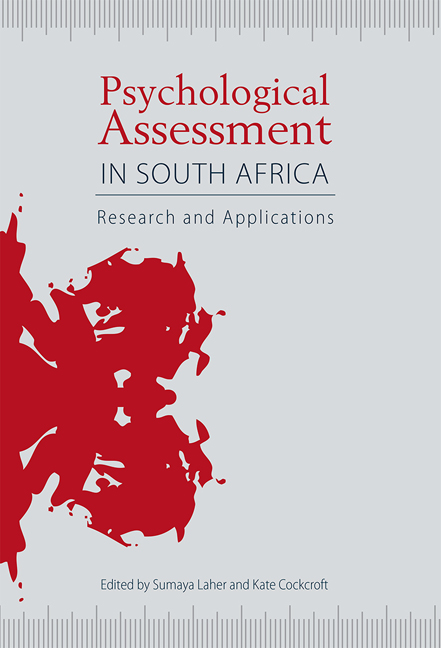Book contents
- Frontmatter
- Contents
- Tables and figures
- Acknowledgements
- Acronyms and abbreviations
- 1 Contextualising psychological assessment in South Africa
- Section One Cognitive tests: conceptual and practical applications
- Section Two Personality and projective tests: conceptual and practical applications
- Section Three Assessment approaches and methodologies
- 28 Ethical perspectives in assessment
- 29 Using computerised and internet-based testing in South Africa
- 30 The ImPACT neurocognitive screening test: a survey of South African research including current and projected applications
- 31 A family consultation model of child assessment
- 32 Qualitative career assessment in South Africa
- 33 Psychological assessment and workplace transformation in South Africa: a review of the research literature
- 34 Assessment of prior learning: a South African perspective
- 35 Large-scale assessment studies in South Africa: trends in reporting results to schools
- 36 Current and future trends in psychological assessment in South Africa: challenges and opportunities
- Contributors
- Index
33 - Psychological assessment and workplace transformation in South Africa: a review of the research literature
from Section Three - Assessment approaches and methodologies
Published online by Cambridge University Press: 21 April 2018
- Frontmatter
- Contents
- Tables and figures
- Acknowledgements
- Acronyms and abbreviations
- 1 Contextualising psychological assessment in South Africa
- Section One Cognitive tests: conceptual and practical applications
- Section Two Personality and projective tests: conceptual and practical applications
- Section Three Assessment approaches and methodologies
- 28 Ethical perspectives in assessment
- 29 Using computerised and internet-based testing in South Africa
- 30 The ImPACT neurocognitive screening test: a survey of South African research including current and projected applications
- 31 A family consultation model of child assessment
- 32 Qualitative career assessment in South Africa
- 33 Psychological assessment and workplace transformation in South Africa: a review of the research literature
- 34 Assessment of prior learning: a South African perspective
- 35 Large-scale assessment studies in South Africa: trends in reporting results to schools
- 36 Current and future trends in psychological assessment in South Africa: challenges and opportunities
- Contributors
- Index
Summary
This chapter is set against the backdrop of a post-apartheid South African society that requires radical transformation of its institutions and organisations in order to attain the ideals of a just and equitable social order. The need for the transformation of South African organisations has been recognised at all levels of the South African economy. At a national, policy-making level the need for transformation has been acknowledged in various forms of legislation and policy – notably legislation and policy relating to black economic empowerment (BEE) and employment equity. At an organisational level there has also been a growing appreciation of the need for transformation, partly in response to the broader legislative environment but also in response to the increasing diversity of the South African workplace, the challenges of globalisation, and the need to redress past inequities.
Depending on how they are used, psychological assessment instruments can play a role either in organisational transformation or in maintaining the status quo. Psychometric tests and other forms of assessment take on a gatekeeping role when used in an organisational context, and therefore can be a key determinant of access to both employment opportunities as well as career mobility. To quote Sehlapelo and Terre Blanche (1996, p.49):
Given South African Psychology's intimate relationship with psychometrics and the continued prevalence of psychometric testing in modern day South Africa, it should obviously be an important site of transformation. The fact is that if psychological tests are used on a large scale to determine who gains access to economic and educational opportunities, and if psychology as a profession is truly interested in empowerment, the reform of testing practices should be one of its priorities. However, testing practices, i.e. the day-to-day use of tests as opposed to technical issues of test construction and validation tends to receive inadequate research attention.
Other authors, including Claassen (1997), Foxcroft (1997) and Nzimande (1995), have made similar claims. Criticisms of assessment instruments (particularly psychometric tests) in use in South African organisations include the fact that many psychometric tests are not standardised for use on a South African population and are thus inherently culturally biased (Bedell, Van Eeden & Van Staden, 1999; Wallis & Birt, 2003). Critical reviews of assessment tools and practices in South Africa have thus contributed to a body of knowledge that positions assessment as a contested terrain.
- Type
- Chapter
- Information
- Psychological Assessment in South AfricaResearch and Applications, pp. 488 - 508Publisher: Wits University PressPrint publication year: 2013



